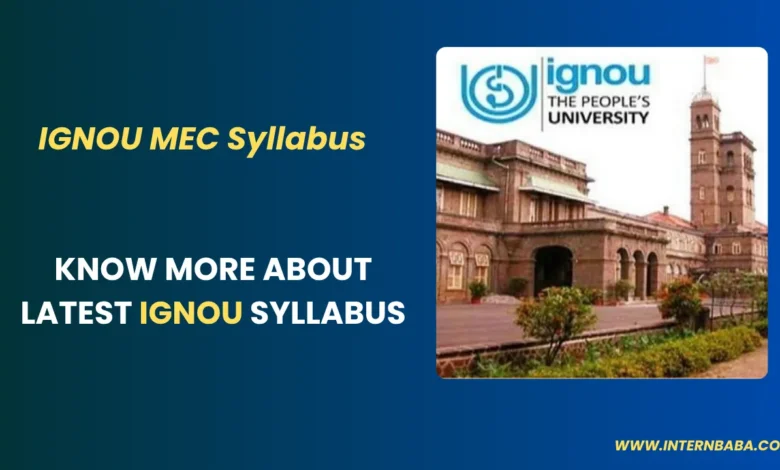IGNOU MEC Syllabus 2025

If you’re planning to pursue a Master’s in Economics through IGNOU, you’re in the right place. The IGNOU MA Economics (MEC) program is one of the most popular postgraduate courses in India, and for good reason. It provides a well-rounded academic foundation that blends theoretical economic knowledge with practical applications. Whether you’re aiming to enter academia, engage in public policy, work in the private sector, or prepare for competitive exams like UGC-NET or the civil services, the MEC program can be a strategic stepping stone.
Many students opt for IGNOU due to its flexible structure, affordability, and the recognition its degrees hold. But before enrolling, it’s crucial to understand the course structure, subjects, and overall syllabus. In this guide, we provide a detailed breakdown of the IGNOU MA Economics syllabus for 2025 to help you prepare and make informed choices about your academic journey.
Overview of IGNOU MA Economics (MEC) Program
The MA Economics program from IGNOU is designed to offer in-depth knowledge in economic theory, policy analysis, and statistical techniques. It follows a semester-based system and provides great flexibility to distance learners across India.
Program Highlights:
| Details | Information |
|---|---|
| Program Name | MA in Economics (MEC) |
| Program Code | MEC |
| Duration | Minimum 2 Years, Maximum 4 Years |
| Total Credits | 80 Credits |
| Medium of Instruction | English |
| Eligibility Criteria | Bachelor’s Degree or equivalent |
| Offered by | School of Social Sciences, IGNOU |
The program structure is tailored for both fresh graduates and working professionals. It enables students to gain a comprehensive understanding of core and applied economics.
IGNOU MEC Syllabus 2025 (Year-Wise Structure)
The MEC syllabus is structured over two academic years. The first year focuses on building a foundation with core economic theories, while the second year offers diverse electives and one compulsory course.
First Year Courses (Compulsory)
| Course Code | Course Title | Credits |
| MEC 101 | Microeconomic Analysis | 6 |
| MEC 002 | Macroeconomic Analysis | 6 |
| MEC 103 | Quantitative Methods for Economic Analysis | 6 |
| MEC 004 | Economics of Growth and Development | 6 |
| MEC 105 | Indian Economic Policy | 6 |
Total Credits in First Year: 30
These foundational subjects help students understand core areas like micro and macroeconomics, economic modeling, development theory, and India’s policy landscape.
Second Year Courses (Elective + Compulsory)
The second year includes one compulsory course and various electives. Students must complete 50 credits in total for this year.
Compulsory Course
| Course Code | Course Title | Credits |
| MEC 106 | Public Economics | 6 |
Elective Courses (Choose to fulfill 44 credits)
| Course Code | Course Title | Credits |
| MECE 001 | Econometric Methods | 6 |
| MECE 003 | Actuarial Economics: Theory and Practice | 6 |
| MECE 004 | Financial Institutions and Markets | 6 |
| MECE 002 | Indian Agricultural Development | 6 |
| MECP 001 | Project Work (Research Based) | 6 |
| MGSE 009 | Gender Issues in Work, Employment & Productivity | 4 |
| MWG 011 | Women in the Economy | 4 |
| MGP 004 | Gandhi’s Political Thought | 4 |
| MGPE 010 | Conflict Management, Transformation and Peace | 4 |
| MGPE 013 | Civil Society, Political Regimes and Conflict | 4 |
| MGPE 014 | Gandhi and Globalization | 4 |
Total Credits in Second Year: 50 (Including MEC 106 and electives)
Students are advised to choose electives based on their career interests. For example:
- Finance/Banking: MECE 004, MECE 003
- Development Sector: MECE 002, MGSE 009
- Academia/Research: MECE 001, MECP 001
- Political Studies: MGPE 014, MGP 004
Key Highlights of the MEC Program
- Comprehensive Curriculum: Covers micro and macroeconomics, development theory, quantitative analysis, and Indian policy.
- Flexible Learning: Ideal for those with jobs or personal commitments.
- Diverse Electives: Blend of economics, sociology, political science, and gender studies.
- Research Component: Option to take on a project course (MECP 001).
- Updated Content: Incorporates real-world economic scenarios, data, and analysis.
Benefits of Choosing IGNOU MEC in 2025
- Revised and Relevant Syllabus: The 2025 syllabus reflects the changing economic landscape with modern tools and current case studies.
- Recognized and Respected Degree: Well-accepted for jobs, UGC-NET, PhD admissions, and international education.
- Affordable Education: One of the lowest-cost postgraduate programs in India without compromising academic quality.
- Distance Learning Advantage: Study at your own pace with access to digital and printed study materials.
- Career Advancement: Suitable for roles in research, academia, financial institutions, and policy think tanks.
Study Tips for IGNOU MEC Students
- Plan Ahead: Break down the syllabus into weekly goals.
- Focus on Core Courses: Strengthen your base in Micro, Macro, and Quantitative Methods.
- Practice Quantitative Problems: Especially from MEC 103 and MECE 001.
- Refer to Past Question Papers: Available on IGNOU portals to understand question patterns.
- Participate in Online Forums: Engage in discussions on IGNOU communities and Telegram groups.
- Use IGNOU Resources: Make full use of eGyankosh, SWAYAM, and virtual classes.
- Project Work Tips: Start early, select a relevant topic, and follow research methodology guidelines strictly.
Frequently Asked Questions (FAQs)
Q1. What is the total duration of the IGNOU MA Economics program?
A1. The program duration is a minimum of 2 years and a maximum of 4 years.
Q2. Can I pursue MEC while working a full-time job?
A2. Yes. IGNOU’s flexible distance learning format is ideal for working professionals.
Q3. How many total credits are needed for MEC completion?
A3. A total of 80 credits is required—30 in the first year and 50 in the second year.
Q4. Is project work mandatory in the second year?
A4. No, MECP 001 is optional. You can complete second-year credits through other electives if you prefer.
Q5. Is the MEC degree valid for UGC-NET and PhD programs?
A5. Absolutely. IGNOU’s MEC is recognized across Indian universities and is valid for UGC-NET, PhD, and other higher studies.
Final Thoughts
The IGNOU MA Economics (MEC) Syllabus for 2025 offers a rich blend of academic theory, quantitative skills, and real-world applications. It’s a great option for students seeking flexibility without compromising on academic rigor. Whether you want to delve into policy research, financial analysis, or teaching, the MEC program gives you the tools to move forward confidently.
Be sure to pick your electives wisely and manage your time well. Make use of all IGNOU resources and don’t hesitate to reach out to the student community for support. With proper planning and consistent effort, you can make the most of your academic journey with IGNOU MEC.







